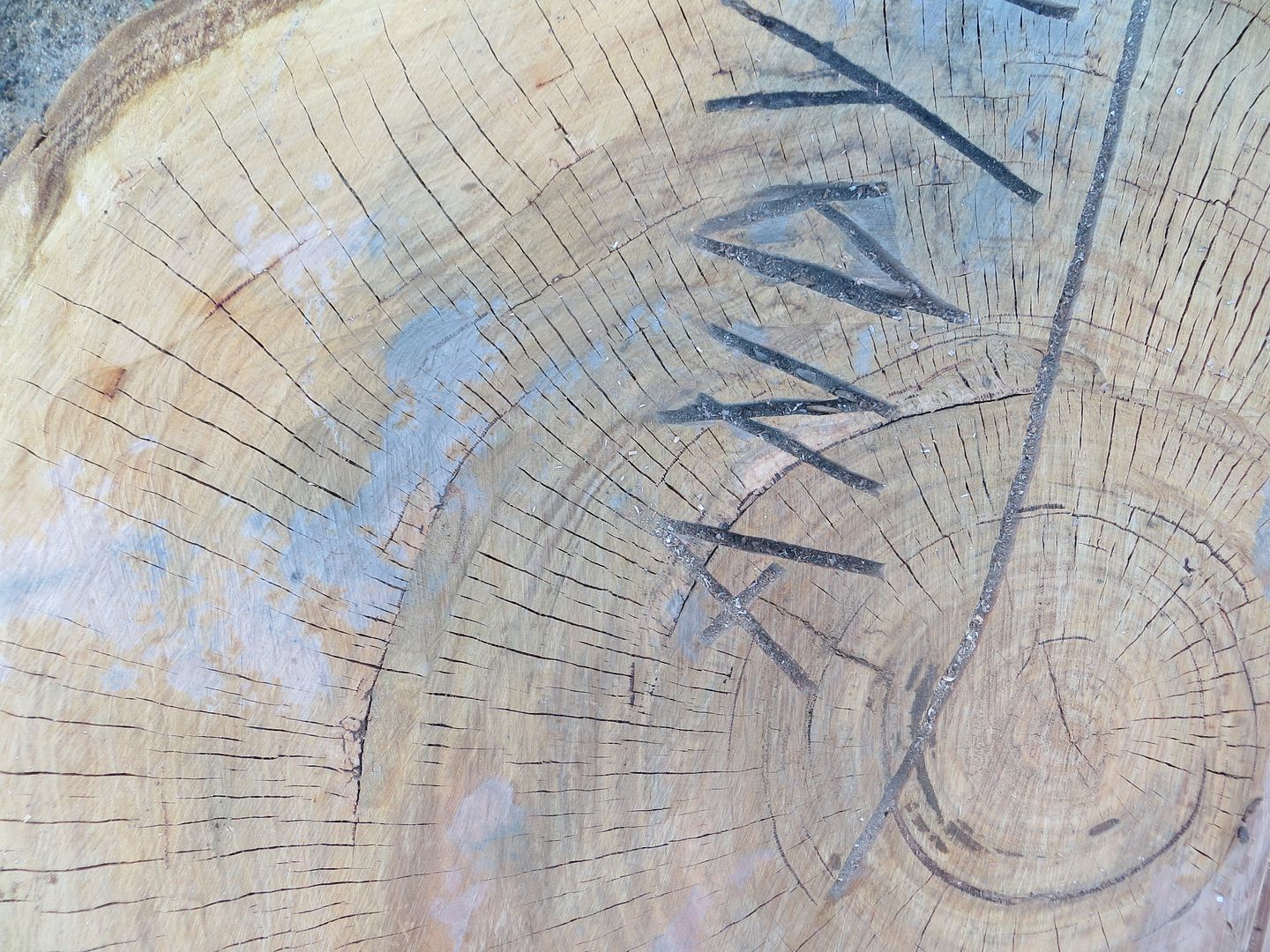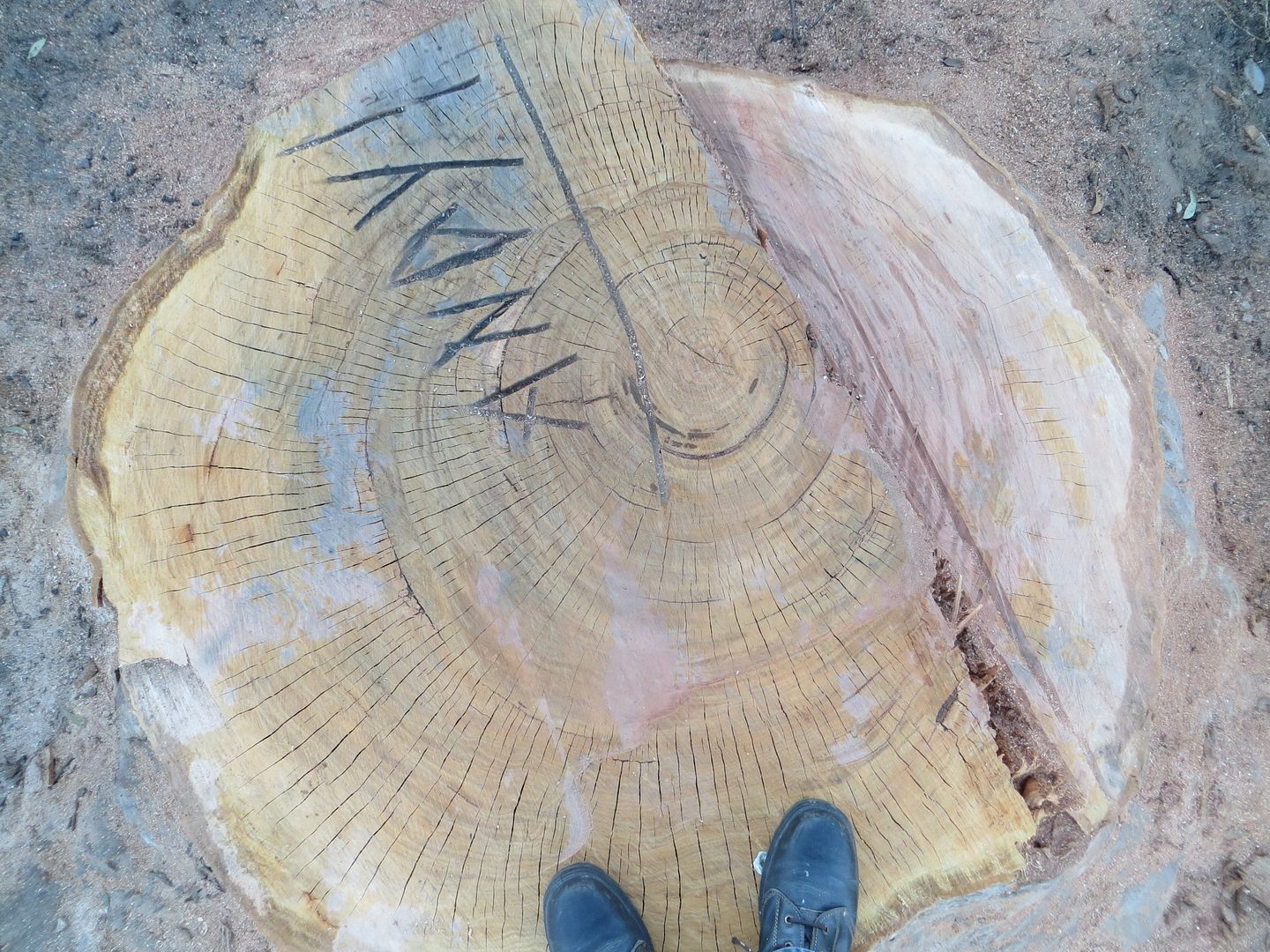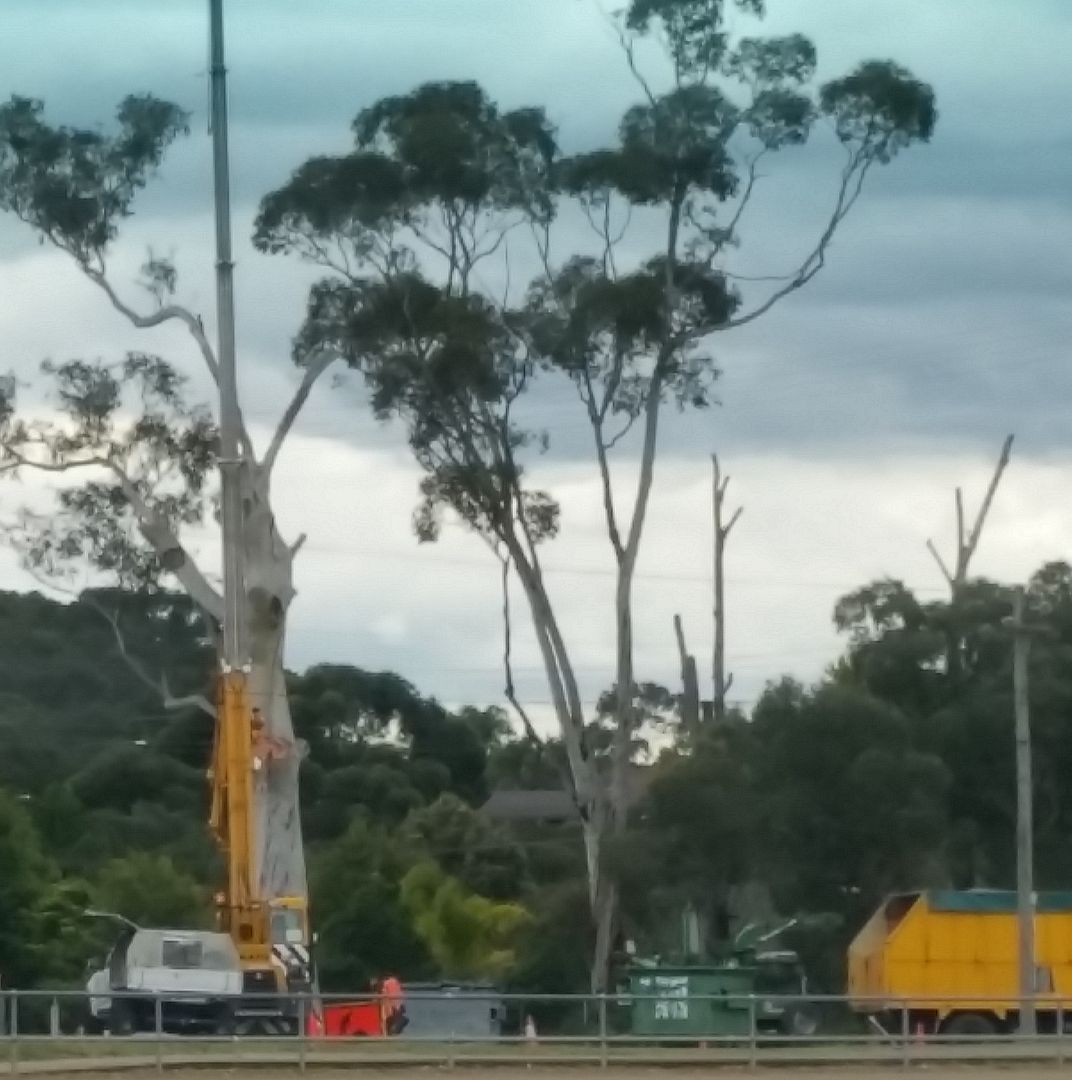Here’s the top of the tree which was cut down a few days ago. I’d like to know how old it is. Possibly Eucalyptus sclerophylla.
Can we tell from these photos?


Here’s the top of the tree which was cut down a few days ago. I’d like to know how old it is. Possibly Eucalyptus sclerophylla.
Can we tell from these photos?


I reckon they should operate on the top one first.
Peak Warming Man said:
I reckon they should operate on the top one first.
golf clap
A very rough count of the rings if I’ve got them right is about 40.
I saved it and zoomed in to try and get where the rings are, I think it’s a black art though.
Peak Warming Man said:
A very rough count of the rings if I’ve got them right is about 40.
I saved it and zoomed in to try and get where the rings are, I think it’s a black art though.
Thanks for that, but I’m almost certain that this tree was already old in the late 1800’s.
stumpy_seahorse said:
Peak Warming Man said:
I reckon they should operate on the top one first.
golf clap
I don’t get it :/
Speedy said:
stumpy_seahorse said:
Peak Warming Man said:
I reckon they should operate on the top one first.
golf clap
I don’t get it :/
‘Triage’
stumpy_seahorse said:
Speedy said:
stumpy_seahorse said:golf clap
I don’t get it :/
‘Triage’
Oh thanks. I would never have got that one :)
Speedy said:
Peak Warming Man said:
A very rough count of the rings if I’ve got them right is about 40.
I saved it and zoomed in to try and get where the rings are, I think it’s a black art though.
Thanks for that, but I’m almost certain that this tree was already old in the late 1800’s.
Please spray the surface with water (or other liquid) and photograph it again. The scattered light from surface irregularities is hiding the rings in the above photographs. Covering it with a layer of water will make the rings much more visible.
Do you have am electric sander you could set one of the kids to work with?
party_pants said:
Do you have am electric sander you could set one of the kids to work with?
they’re kids…
young and vibrant…
give them a sanding block and some sandpaper sheets…
mollwollfumble said:
Speedy said:
Peak Warming Man said:
A very rough count of the rings if I’ve got them right is about 40.
I saved it and zoomed in to try and get where the rings are, I think it’s a black art though.
Thanks for that, but I’m almost certain that this tree was already old in the late 1800’s.
Please spray the surface with water (or other liquid) and photograph it again. The scattered light from surface irregularities is hiding the rings in the above photographs. Covering it with a layer of water will make the rings much more visible.
As a footnote, the rings develop due to changes in weather (temperature and rainfall) between summer and winter. If the weather during summer and during winter is the same then the ring that develops will be much more difficult to see. So rings in southern Australian climates are easier to count than those from northern Australia.
If the rings are still too difficult to see after dousing with water, cut a wedge and sand it with progressively finer sandpaper to polish, before adding a final layer of water or car polish.
As a last resort cut a wedge and take it along to the state museum for carbon dating.
The CSIRO Division that used to be called “Atmospheric Science” at Aspendale has an annotated slice through a very old tree in the foyer.
> Eucalyptus sclerophylla
Also known as the Scribbly Gum. Some can grow to exceedingly great age. This Scribbly Gum tree has an extimated age of 600 years.
“Eucalyptus botryoides plants have been dated at 600 years of age”.
mollwollfumble said:
Speedy said:
Peak Warming Man said:
A very rough count of the rings if I’ve got them right is about 40.
I saved it and zoomed in to try and get where the rings are, I think it’s a black art though.
Thanks for that, but I’m almost certain that this tree was already old in the late 1800’s.
Please spray the surface with water (or other liquid) and photograph it again. The scattered light from surface irregularities is hiding the rings in the above photographs. Covering it with a layer of water will make the rings much more visible.
Will do. Thanks moll.
mollwollfumble said:
> Eucalyptus sclerophyllaAlso known as the Scribbly Gum. Some can grow to exceedingly great age. This Scribbly Gum tree has an extimated age of 600 years.
“Eucalyptus botryoides plants have been dated at 600 years of age”.
Yes, I am aware that they can get very old. This was one of the largest diameter ones I have seen. Could have easily have been turned into a habitat tree (was still healthy-looking, but had dropped a couple of large branches onto a building). It was decided to cut it right back. Its location is a public park which will be developed in the next 5 years or-so. There are a couple of other trees of this species, which were sick and had been turned to habitat trees a few years ago. These are being used by parrots. Another white elephants was not needed.
Council has now placed big skip bins in front of this stump. Around here, no-one will notice the tree gone, but know that “something” looks different.
Here is the pic of them cutting it down, which was taken many hours (and truckloads) after they had begun. This tree’s form looked very similar to the one in moll’s link.

widow makers?
I’d be more interested in how someone wrote inside the tree back in the 1800s. Very perplexing.
That tree doesn’t look like a really old one to me. Not knowing the growing conditions etc, I would have guessed that it was a planted one maybe 50 to 60 years. Based only on how fast I’ve seen trees I’ve planted grow. There are eucs in our backyard here that are of that girth or a bit more which are probably 70 or 80 years old. And we have one old redgum which is probably triple that girth which we seriously think may be a couple of hundred years old.
Arts said:
widow makers?
Yes indeed. If it had have been left as it was, that is. It was in a high-use area. Coat-hangered habitat trees, however, are much more stable, generally dropping branches only once they have decayed completely, rather than unpredictably or during strong winds.
This is a E. botryoides planted in 1999. The photo is a couple of years ago. Not much scale on that, I know, but it already has a reasonable trunk on it. E. botryoides was a recommended public area tree at one stage as it does not apparently drop branches as much as many others.
buffy said:
That tree doesn’t look like a really old one to me. Not knowing the growing conditions etc, I would have guessed that it was a planted one maybe 50 to 60 years. Based only on how fast I’ve seen trees I’ve planted grow. There are eucs in our backyard here that are of that girth or a bit more which are probably 70 or 80 years old. And we have one old redgum which is probably triple that girth which we seriously think may be a couple of hundred years old.
Yeah some of those gums really go, a neighbour planted two box gums on their footpath maybe 20 years ago and they are bloody huge now, 100 feet tall easy but being box gums they don’t have a big girth.
The big gum I had lopped was planted in the 40s and was a pretty impressive size, so much so that I feared for the house everytime there was a storm. It was lopped about 5 metres up leaving on one large branch that was left at about two metres long. I am much happier now and the birds don’t seem to mind, it has grown an impressive top of dense growth that also flowers really well.
buffy said:
That tree doesn’t look like a really old one to me. Not knowing the growing conditions etc, I would have guessed that it was a planted one maybe 50 to 60 years. Based only on how fast I’ve seen trees I’ve planted grow. There are eucs in our backyard here that are of that girth or a bit more which are probably 70 or 80 years old. And we have one old redgum which is probably triple that girth which we seriously think may be a couple of hundred years old.
From my research, I found that there were many trees planted at that site in the 1890’s, but assume that these would have been non-native species.
This species grows in the remnant bushland across the road, so it was probably there beforehand. This one is on a ridgetop on sandstone with shallow soil.
evening
sorry wrong fred
Speedy said:
Arts said:
widow makers?
Yes indeed. If it had have been left as it was, that is. It was in a high-use area. Coat-hangered habitat trees, however, are much more stable, generally dropping branches only once they have decayed completely, rather than unpredictably or during strong winds.
I was sitting at uni one day last semester when there was a loud crack and I looked up in time to see a largish (It would have hurt) branch fall down. it wasn’t raining and it wasn’t a particularly windy day.. it just gave way… weird to watch since you don’t expect them to just all without any obvious outside force.
Arts said:
Speedy said:
Arts said:
widow makers?
Yes indeed. If it had have been left as it was, that is. It was in a high-use area. Coat-hangered habitat trees, however, are much more stable, generally dropping branches only once they have decayed completely, rather than unpredictably or during strong winds.
I was sitting at uni one day last semester when there was a loud crack and I looked up in time to see a largish (It would have hurt) branch fall down. it wasn’t raining and it wasn’t a particularly windy day.. it just gave way… weird to watch since you don’t expect them to just all without any obvious outside force.
we’ve had a couple like that here.
pulled the euc saplings out and burnt them a couple of weeks ago, don’t need more to worry about
Arts said:
Speedy said:
Arts said:
widow makers?
Yes indeed. If it had have been left as it was, that is. It was in a high-use area. Coat-hangered habitat trees, however, are much more stable, generally dropping branches only once they have decayed completely, rather than unpredictably or during strong winds.
I was sitting at uni one day last semester when there was a loud crack and I looked up in time to see a largish (It would have hurt) branch fall down. it wasn’t raining and it wasn’t a particularly windy day.. it just gave way… weird to watch since you don’t expect them to just all without any obvious outside force.
The tree across the road from work has done that a couple of times, and the branches fall onto the road. Big branches too, like 15-20 cm diameter. Luckily nobody was driving past at that exact moment. I do get a bit nervous driving underneath it.
party_pants said:
Arts said:
Speedy said:Yes indeed. If it had have been left as it was, that is. It was in a high-use area. Coat-hangered habitat trees, however, are much more stable, generally dropping branches only once they have decayed completely, rather than unpredictably or during strong winds.
I was sitting at uni one day last semester when there was a loud crack and I looked up in time to see a largish (It would have hurt) branch fall down. it wasn’t raining and it wasn’t a particularly windy day.. it just gave way… weird to watch since you don’t expect them to just all without any obvious outside force.
The tree across the road from work has done that a couple of times, and the branches fall onto the road. Big branches too, like 15-20 cm diameter. Luckily nobody was driving past at that exact moment. I do get a bit nervous driving underneath it.
A schoolgirl was killed by a falling branch not too far from here a couple of years ago :(
My boys went to a school with lots of bushland and many parents started to panic. Arborists were called in, with some trees being cut down. All trees are now closely monitored.
buffy said:
Sorry, I missed the link back there:(And then went off with Blakes 7 and stopped watching you lot)
This tree is younger than mine.
I think Eucs tend to drop big branches during hot still weather. They can sound like a gunshot, followed by a thud. I’ve heard it in the paddocks. We had ancient ones in the paddock in Hawkesdale and one went during the night. Very large branch, would have killed. Missed the concrete tank by that much…
roughbarked said:
buffy said:
Sorry, I missed the link back there:(And then went off with Blakes 7 and stopped watching you lot)
This tree is younger than mine.
I told you how old it is.
buffy said:
I think Eucs tend to drop big branches during hot still weather.
In 2010/2011, the Sydney sea eagles on webcam lost their nest branch. It was a very hot day in February. Luckily, the 2 juvenile eagles were perched in a way that allowed them to fly to a nearby tree.
buffy said:
I think Eucs tend to drop big branches during hot still weather. They can sound like a gunshot, followed by a thud. I’ve heard it in the paddocks. We had ancient ones in the paddock in Hawkesdale and one went during the night. Very large branch, would have killed. Missed the concrete tank by that much…
I’ve been cutting all the euc branches that hang out horizontally off before it gets to that stage
http://www.abc.net.au/local/stories/2014/02/12/3943191.htm
An arborist on this phenomenon.
buffy said:
http://www.abc.net.au/local/stories/2014/02/12/3943191.htm
An arborist on this phenomenon.
“It’s just the normal thing that eucalypts do. It’s a way of preserving their life. They shed limbs to retain the moisture within the rest of the tree, so the tree can survive.”
I thought it was due to expansion causing stress.
Off topic, but about tree limbs.
At my CSIRO there was a lovely eucalypt stage tree.
They put a children’s mustering area underneath in order to give them shade.
Then because of concerns about branches they cut down the tree, so the children boiled in the Sun. Bad move.
I had a council arborist look at my big tree, he thought it was safe. The big branches were made from heartwood and not a socket type attachment from bark growth and he checked the soil at the base of the trunk, apparently that reveals movements if it is weakly rooted. But I still had it beheaded.
Speedy said:
Council has now placed big skip bins in front of this stump. Around here, no-one will notice the tree gone, but know that “something” looks different.
Further to this, I went back this morning to see if I could get a better photo. Skips bins are now gone and so is the stump.
Speedy said:
Speedy said:
Council has now placed big skip bins in front of this stump. Around here, no-one will notice the tree gone, but know that “something” looks different.
Further to this, I went back this morning to see if I could get a better photo. Skips bins are now gone and so is the stump.
Damn.
I planted a Ecualyptus melliodora in 1981 and it is now about 60 + feet tall. I estimnated this because I cut the Eucaly[tus occidentalis I put next to it at the same time and when I measured it it was 48 feet.
Seeing this stuff in the news:
http://www.abc.net.au/news/2016-08-31/sam-dastyari-charity-returns-donation/7802412
I think Mr Bernardi should remember the saying….be careful what you wish for…Caesar’s wife etc.
Sorry.
buffy said:
Seeing this stuff in the news:
http://www.abc.net.au/news/2016-08-31/sam-dastyari-charity-returns-donation/7802412
I think Mr Bernardi should remember the saying….be careful what you wish for…Caesar’s wife etc.
He wants to take us back to the tree-age?